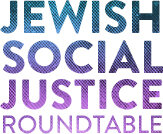Jewish Resources on Democracy and Freedom
We are at a crossroads. The democratic rights that we have long depended on to safeguard our society are being dismantled. Protecting democracy will require Americans to resist capitulation and reimagine a world where we all feel safe and secure. Such a resistance and reimagining must occur across all lines of difference, including race, gender, class, financial status, sexual orientation, age, ability, and religion.
As Jews committed to a democratic future in this country, we are launching a full-throated and widespread Jewish resistance to authoritarianism as part of a broader multifaith effort.
Below is a list of Jewish resources from across denominations and organizations as inspiration and support for sermons during and after the High Holidays.
Talking Points for Clergy on Countering Antisemitism and Protecting Democracy, from the Jewish Council on Public Affairs, includes key findings, talking points, and language rooted in our values—designed to help rabbis and Jewish leaders speak honestly and courageously about antisemitism, democracy, and the work we must do together in this critical moment.
Yom Kippur text study is a source sheet created by Rachael Houser for the Religious Action Center of Reform Judaism’s (“RAC”) "Every Voice, Every Vote" campaign. It focuses on the themes of justice, community responsibility, and the connection between Jewish values and democratic participation, particularly in the context of Yom Kippur.
Jewish Texts for Engagement, created by Rabbis Erica Asch, Adam Stock Spilker, and Shoshanah Conover for the RAC, is a compilation of Jewish texts, commentaries, and discussion questions to help Jewish communities understand civic engagement as a core Jewish value, stemming from the concept of tikkun olam.
Voting Matters Text Study, prepared by Rabbi Dara Lithwick for the RAC, compiles a series of texts that explores voting not just as a civic duty but as a deep Jewish responsibility, rooted in religious texts and historical experience, for the betterment of society and the protection of liberties.
Elections and Selecting our Leaders, a source sheet created by Rabbi Michael Namath for the RAC, shares the evolution of leadership selection throughout Jewish tradition and suggests how these texts provide lessons for contemporary values and modern society.
Authority, Authoritarianism and the Daughters of Tzelofchad, by Rabbi Nelly Altenburger, spiritual leader of Congregation Adath Israel (Middletown, CT), provides Jewish texts and history exploring Jewish concerns about authoritarianism.
In The Constraints and Abuses of Power: From the Book of Deuteronomy to the U.S. Constitution to Today, Rabbi Bob Gluck, of the Reconstructionist movement, explores how the abuses of power warned about in ancient Israel are relevant to modern times in the U.S, drawing on Jewish and American texts.
Introducing "Practices for Defending Democracy” by Rabbi Nancy Fuchs Kreimer, suggests that practices for defending democracy are integral to strengthening the collective spirit and preparing for challenging times. To resist tyranny and uphold justice, the piece compiles transformative practices from historical lessons, Timothy Snyder’s reflections on the fragility of democracy, and small, daily actions that bring us closer to the divine and help build a better world. Rabbi Kreimer is associate professor emeritus of religious studies and the founding director of the Department of Multifaith Studies and Initiatives at the Reconstructionist Rabbinical College.
Sources and Resources for Rabbis on Democracy. As Jewish leaders, rabbis have a powerful voice and moral weight that has outsized impact in their communities. A More Perfect Union has compiled this list of sources and resources to assist rabbis who wish to lead their communities in protecting and strengthening democracy.
To add resources to this list, or to learn more about this effort, email us at info@jewishsocialjustice.org.
